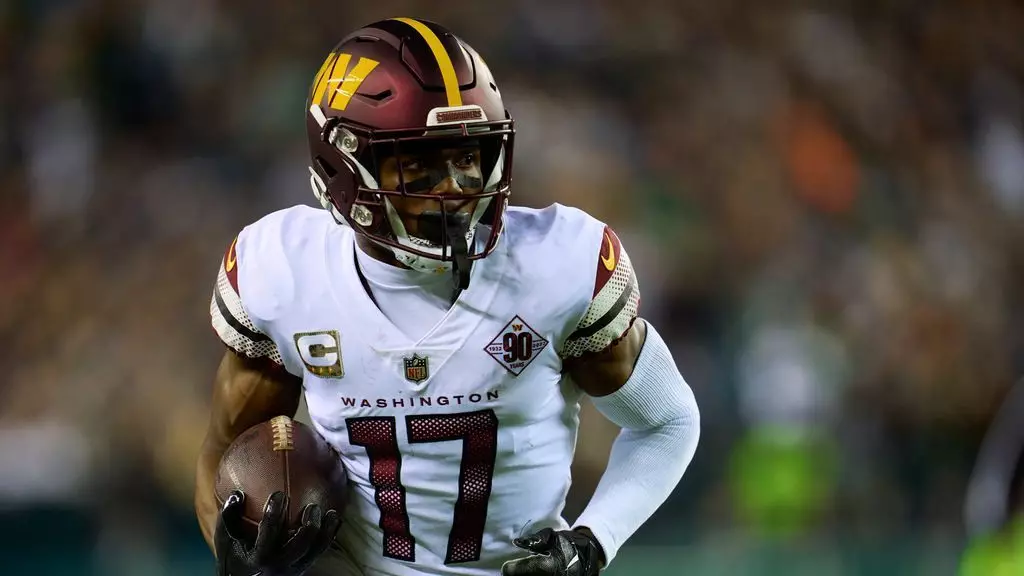In the high-stakes, relentless world of professional football, player-team relationships are often painted with broad strokes of admiration and loyalty. Yet beneath this glossy veneer lies a complex web of negotiations, ambitions, and sometimes, outright conflicts. When a star receiver like Terry McLaurin publicly requests a trade, it’s not merely about a contract—it exposes the fragile balance of trust and value that teams and players negotiate behind closed doors. Such moves are sometimes dismissed as minor distractions, but they fundamentally challenge the narrative of team unity and stability.
McLaurin’s case illustrates a broader trend: players increasingly leverage the power of their personal brand and on-field performance to negotiate for better financial security. The fact that he is considered a “hold-in”—reporting to camp but disengaged from full participation—speaks volumes about how athletes are taking control of their destinies, often in defiance of team expectations. This isn’t just about one receiver; it reflects a seismic shift where players are aware of their market worth and refuse to accept being undervalued, even if it sparks tension with management.
The Business of Football: A Ruthless Arena
One of the most compelling aspects of this situation is the recognition that the NFL operates as a ruthless business at its core. The coaching staff’s calm response—Dismissing McLaurin’s trade request as “normal business” — offers insight into the league’s prevailing mindset. Yet, this rhetoric subtly masks the underlying reality: players are increasingly treated as commodities, with their career peak and market value dictating their leverage.
The specific dispute revolves around McLaurin’s aging curve and contract comparisons with younger stars like DK Metcalf. Washington’s reluctance to pay top dollar to a receiver approaching 30 exposes the harsh economics of the sport: teams are hesitant to commit large sums to players whose physical decline is inevitable. Conversely, players like McLaurin see their value justified by their consistent production, evidenced by multiple 1,000-yard seasons and Pro Bowl selections. The tension boils down to a simple question—how much is a player truly worth, and who has the final say in setting that price?
Leadership’s Dilemma: Maintaining Unity Amid Frustration
Washington’s coaching staff appears to adopt a neutral stance, attempting to shield the team from internal fractures while supporting their star player’s right to negotiate. But this approach may overlook the ripple effects of publicly downplaying such disputes. When a team declares that contract battles are “business as usual,” it risks unintentionally diminishing the value of player loyalty and individual aspirations.
Furthermore, about McLaurin’s status as a beloved figure in the locker room and among fans, it’s evident that his on-field contributions and his character boost team morale. Yet, when a key player is sidelined due to a contract standoff, the cohesion of the roster and the team’s focus can be put under strain. Coaches and management must navigate a fine line between maintaining discipline and respecting players’ rights to fight for fair compensation—an increasingly difficult task in today’s hyper-informed sports environment.
Future Implications: The New Norm in Player-Management Dynamics
McLaurin’s situation signifies a new era where NFL players are less willing to accept the old-school notions of loyalty and patience. Instead, they are embracing transparency and public negotiations to maximize their leverage. From a broader perspective, this could shift the power dynamics within the league, compelling teams to reassess how they handle contracts, player relations, and the importance of star power.
The league’s future could be marked by more high-profile cases akin to McLaurin’s, with players leveraging their performance and presence to negotiate better deals, even if it causes temporary turmoil. For teams, that demands a strategic rethink—balancing the pursuit of immediate success with long-term player satisfaction.
In essence, the NFL must come to grips with a new reality: player empowerment is here to stay, and fostering a culture of mutual respect and open negotiation is crucial for sustained success. McLaurin’s trade request, while seemingly disruptive now, might be a catalyst for a more transparent and equitable player-management relationship in the years to come.

